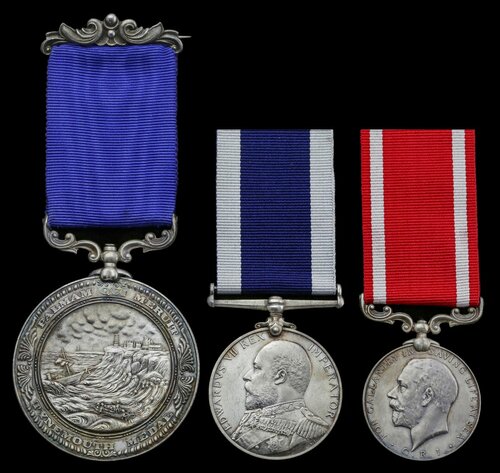
Auction: 20003 - Orders, Decorations and Medals
Lot: 239
A pre-Great War Sea Gallantry Medal group of three awarded to Leading Boatman W. Marsden, Blyth Haven Coast Guard, also the winner of a rare Tynemouth Medal on the same occasion
Sea Gallantry Medal, G.V.R., silver (Willliam Marsden, “Dunelm”, 11th January 1913); Royal Navy L.S. & G.C., E.VII.R. (168524 W. A. Marsden, Boatman, H.M. Coast Guard); Tynemouth Medal, silver, inverted reverse type (a.k.a. the Tynemouth Extension Medal), this officially engraved, ‘Awarded to Coastguard William Marsden, 11th January 1913, for bravery in saving life at sea’, fitted with scroll suspender and ornate suspension brooch, generally good very fine (3)
Approximately 100 awards of the Tynemouth Medal.
Sea Gallantry Medal 14 May 1913. Board of Trade records state:
‘At 10.45 a.m. on 11 January 1913, during a very heavy gale, the Dunelm, of Sunderland, England, stranded on Seaton Sea Rocks, Blyth and became a total wreck. The North Blyth Volunteer Life Saving Apparatus Company arrived at 11.20 a.m. but gear had to be carried over rocks for about 900 yards. The Tide was running swiftly and eventually the gear had to be abandoned. A seaman jumped overboard with a line attached to him and swam to a ledge of rocks which two members of the L.S.A. Company had reached. The line was used for the whip and the remaining 14 members of the crew were landed on the ledge. During the operations the whip fouled the rocks and Marsden jumped into the sea to clear it. He was twice washed away and nearly drowned, but was rescued by Gibney and Archibold. After reaching the rocks, the men had to make their way or be assisted to the shore. The tide came in and marooned six men. Kelsey, Robertson and Scott were the last of the rescuers whose retreat was cut off, but they remained on the rocks until all the crew were landed. Nixon went off to the ledge in a small boat and rescued two men. McCarthy then took out a small boat. The four remaining men got into it, but it capsized and McCarthy was nearly drowned. Brown and Beading thereupon took out the boat and tried to reach one of the rescuers named Hurrell, but he sank before they could reach him. They, however, rescued three other men.’
The Board of Trade granted the Silver Medal and £2 to Marsden, and Bronze Medals and £2 to nine other rescuers from the Life Saving Apparatus Company or Cambois Lifeboat, Marsden’s services being further recognised by the award of the Tynemouth Medal after a meeting of the Trust held on 19 February 1913.
William Marsden was born in Goole, Yorkshire in April 1876, and entered the Royal Navy as a Boy 2nd Class in June 1892. Advanced to Able Seaman in April 1898, and following further seagoing and shore appointments, he transferred to the Coast Guard as a Boatman at Winterton in December 1903, in which place he remained employed until removing to Blyth Haven in 1911. Awarded his L.S. & G.C. Medal in January of the latter year, he was advanced to Leading Boatman in May 1912, shortly prior to his S.G.M.-winning exploits.
As per the following report published in The Times, Marsden and his fellow rescuers received their awards from George V on 16 December 1913:
‘His Majesty listened to moving stories of unselfishness and pluck at Buckingham Palace yesterday, when he decorated a number of men, many of them hailing from the North-country, who had distinguished themselves by acts of special gallantry in saving or attempting to save life. The King, who seemed deeply touched by the narratives, pinned medals to the breasts of various recipients, and afterwards shook hands with them.’
An appointment at President IV having followed between October 1916 and April 1919, the base of the Admiral in command of the Coast Guard and Reserves, Marsden was pensioned ashore in the latter month; sold with a full file of research.
Subject to 20% VAT on Buyer’s Premium. For more information please view Terms and Conditions for Buyers.
Sold for
£1,200
Starting price
£1000




